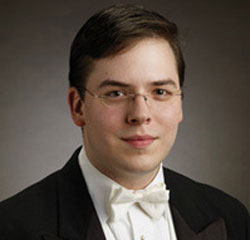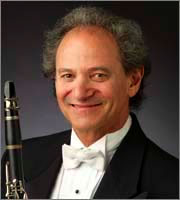by Guytano Parks

John Williams wrote his Liberty Fanfare to commemorate the 1986 centenary of New York’s iconic Statue of Liberty. This short, exuberant piece opened the program, setting an optimistic mood with bold playing by the brass, soaring melodies by the strings and rhythmic impetus by the percussion. Feddeck conducted this, as well as the second offering by Williams, a suite of three pieces from the recent Spielberg film Lincoln, with a keen sense of mood and dramatic understanding. The orchestra responded superbly to his every gesture and nuance as the scenes unfolded.
The first of the scenes, The People’s House, harkened back to a bygone era with its contemplative character, simple melody and comforting sound of the piano, played by Joela Jones. Jung-Min Amy Lee, serving as concertmaster this evening, displayed some mighty fine country fiddling chops as she opened the second scene, Getting out the Vote. Excitement, determination and anticipation were conveyed in this driving dance-like section. Richard Weiss’s playing of the opening cello solo in the last scene of the set, With Malice Toward None, was lovely and the gradual swelling of the violins and addition of the other sections of the orchestra built to richness and grandeur.
Reminiscent of the gypsy rhapsodies of other composers in content and form, Oscar Navarro’s II Concerto for Clarinetand orchestra served as the vehicle for soloist Franklin Cohen, principal clarinet of The Cleveland Orchestra since 1976. In one movement consisting of three main sections — fast-slow-fast — this attractive and accessible piece teemed with all that is Spanish, including some hand-clapping in the flamenco vein.

Three Spirituals arranged for unaccompanied chorus by Moses Hogan made quite an impression after intermission. No surprise, though, as The Blossom Festival Chorus, prepared by Lisa Wong, is known for its impeccable diction and pitch-perfect delivery. A surging and dynamic My Soul’s Been Anchored in the Lord began the set, followed by Harry Dixon Loes’s This Little Light of Mine, notable for its poignant and wordless oohs and aahs under soprano Laquita Mitchell and baritone Eric Greene’s solos. The traditional I Can Tell the World shimmered with a concentrated, harmonious sound, full of punctuating consonants and an exciting manipulation of dynamics. Feddeck conducted with clarity and command, successfully coaxing every last drop of expressiveness from the choristers.
Considered by many to be his crowning achievement, George Gershwin’s opera, Porgy and Bess, is based on DuBose Heyward’s 1924 novel Porgy. The libretto is by Heyward, who also collaborated with Ira Gershwin on the lyrics. This concert version of its highlights was arranged and orchestrated by Robert Russell Bennett. A brief and vigorous Introduction by the orchestra set the scene for the first aria, “Summertime.” Soprano Laquita Mitchell, in the role of Bess, sang this tender lullaby (sung by Clara in the opera) in a clear and radiant voice, projecting effortlessly above the orchestra. Baritone Eric Greene, as Porgy, delivered a driving “A Woman Is a Sometime Thing,” followed by “Gone, Gone, Gone” by chorus, Mitchell and Greene.
Mitchell was powerful and heart-wrenching in her interpretation of “My Man’s Gone Now,” wailing away at the end with ascending and descending vocal slides. Mitchell and the chorus then sang an optimistic “Promised Land” before Greene launched into a charmingly contented “Oh, I Got Plenty o’ Nothin’ ” with a banjo adding to the folksiness.
“Bess, You Is My Woman Now” had an intoxicating lilt, endearingly giddy with a certain naivety. Greene and Mitchell luxuriated and swooned as Porgy and Bess, professing their love for one another as Feddeck and the orchestra was attentive to their every nuance.
Then the Chorus sang an exciting “Oh, I Can’t Sit Down” before tenor Rodrick Dixon, as Sportin’ Life, entered the scene with a bad boy swagger preaching “It Ain’t necessarily So” with his sentiments echoed by the chorus. Dixon was dynamic, amusingly remaining in character as he sanctimoniously sat back down before singing “There’s a Boat Dat’s Leavin’ Soon for New York.” Concluding with a rousing “Oh Lawd, I’m on My Way,” Greene and the chorus brought to a close Bennett’s masterful orchestration with three of the opera’s main characters and chorus telling the story of the people of Catfish Row, by the docks of Charleston.
As the appreciative audience applauded and cheered, Feddeck led orchestra, chorus and vocal soloists in a reverent and soaring encore, America The Beautiful, arranged by Carmen Dragon.
The Cleveland Orchestra played brilliantly, illuminating all of the inherent jazziness and seriousness in Gershwin’s colorful score. And thus, on this brilliant note, James Feddeck nears the end of his fourth and final year as assistant conductor of The Cleveland Orchestra and music director of The Cleveland Orchestra Youth Orchestra with a legacy of highly distinguished and memorable performances to his credit. With deep appreciation and fondness, Cleveland says: Bravo, Maestro, and thank you!
Published on ClevelandClassical.com July 24, 2013
Click here for a printable version of this article.



